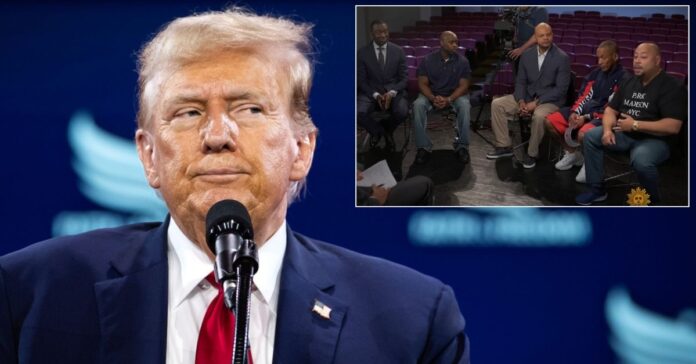The Central Park Five are urging a federal judge in Pennsylvania not to dismiss their defamation lawsuit against Donald Trump. The group says Trump’s comments during a presidential debate this year were just the latest in a long campaign of “harassment” against them—one that has lasted over three decades.
The lawsuit centers around Trump’s remarks at the debate on September 10, 2024, where he claimed the Central Park Five had “pled guilty” to crimes they didn’t commit. This statement, the plaintiffs argue, was both false and harmful, adding to years of public attacks from Trump, dating back to the infamous full-page ads he took out in New York newspapers in 1989. At the time, he called for the execution of the five teenagers—young Black and Latino boys who were wrongfully accused of a brutal crime in Central Park.
In their response to Trump’s motion to dismiss the case, lawyers for the Central Park Five said Trump’s attempts to defend his remarks as “opinion” or “political rhetoric” didn’t hold water. The plaintiffs argued that statements like “they pled guilty” are factual claims that can be proven true or false, not just opinions.
The plaintiffs’ court filing highlights Trump’s long history of attacking them. They pointed out that shortly after the boys were arrested in 1989, Trump publicly said he “hated” them and would “always” hate them. Over the years, he has continued to make hateful and false statements about the group through media appearances, on social media, and even during his presidency. The comments at the debate, they said, were the culmination of this relentless vendetta.
During the debate, Trump defended his controversial 1989 ads by claiming that many people, including former New York City Mayor Michael Bloomberg, agreed with him at the time. He also insisted that the five young men had admitted to the crimes, saying, “They pled guilty. And I said, well, if they pled guilty, they badly hurt a person, killed a person ultimately.” The problem with Trump’s statements, the plaintiffs argue, is that they were demonstrably false. None of the Central Park Five ever pled guilty, and no one died in the attack they were falsely accused of committing.
Trump’s lawyers, on the other hand, argue that his comments were part of a broader discussion about crime and public safety, which are matters of public concern. They also claim his remarks weren’t defamatory because they were “substantially true.” According to Trump’s legal team, the difference between formally pleading guilty in court and admitting guilt is just a technicality.
The Central Park Five strongly disagreed, stating that Trump’s argument about “technical inaccuracies” doesn’t excuse false claims that have caused significant harm to their reputations. They pointed out that Trump has argued the opposite in his own defamation lawsuit against a media outlet, where he said even minor differences in wording could have a significant impact on someone’s reputation.
The group also pushed back against Trump’s claim that his remarks were just opinions. They noted that facts, not opinions, can be agreed upon. For example, they said it’s a verifiable fact that Neil Armstrong landed on the moon, even though some people might wrongly believe otherwise.
Ultimately, the Central Park Five argued that whether Trump’s statements were “substantially true” is a question for a jury, not something that can be dismissed early in the case. They used Trump’s own arguments from his lawsuit to show that these kinds of issues require careful consideration.
This legal battle marks another chapter in the long and painful story of the Central Park Five, who were exonerated in 2002 after spending years in prison for crimes they didn’t commit. Now, they are fighting to hold Trump accountable for what they say are false and harmful statements about their case, statements that have perpetuated injustice and tarnished their names for decades.





